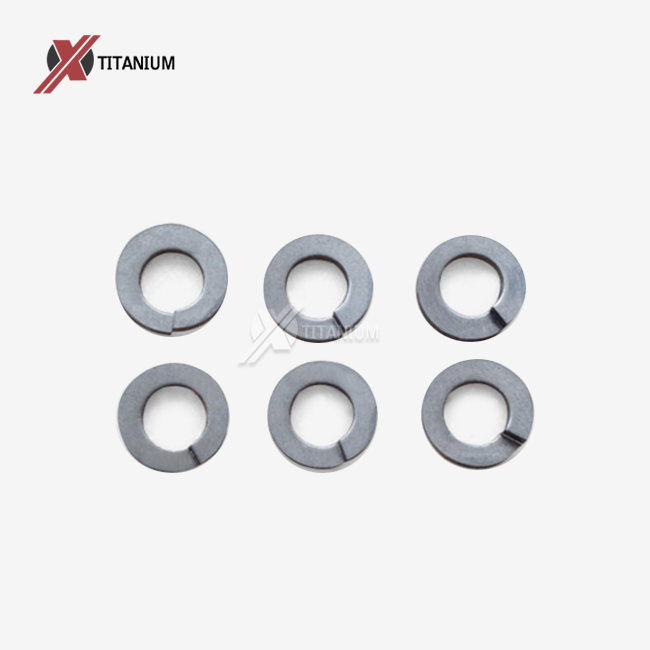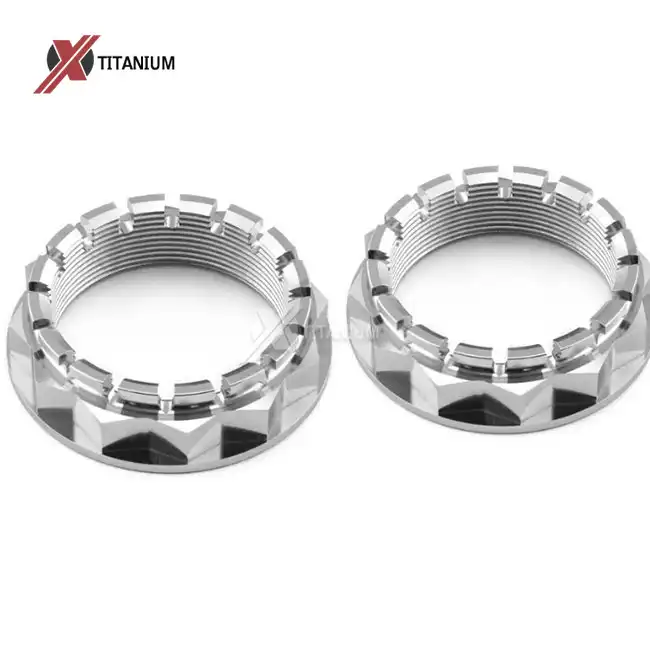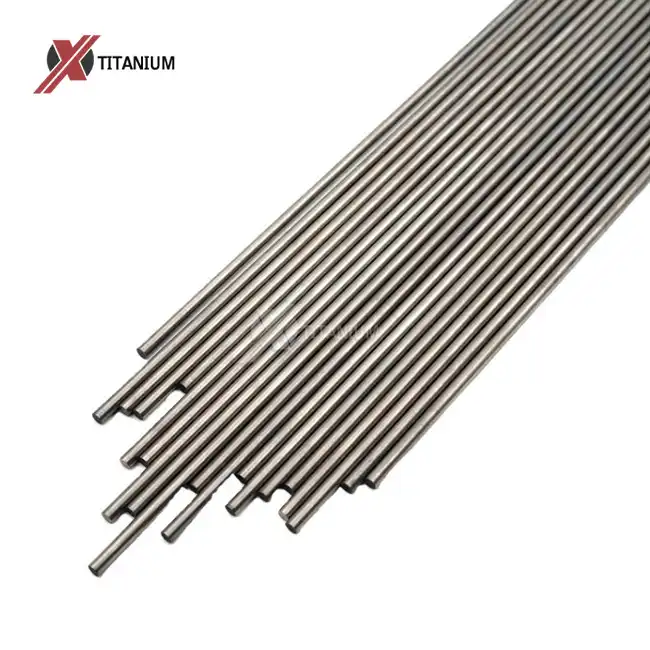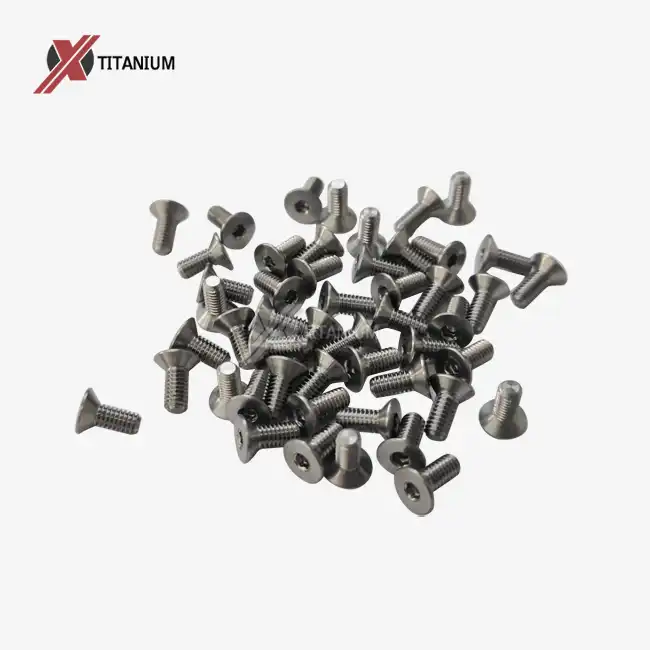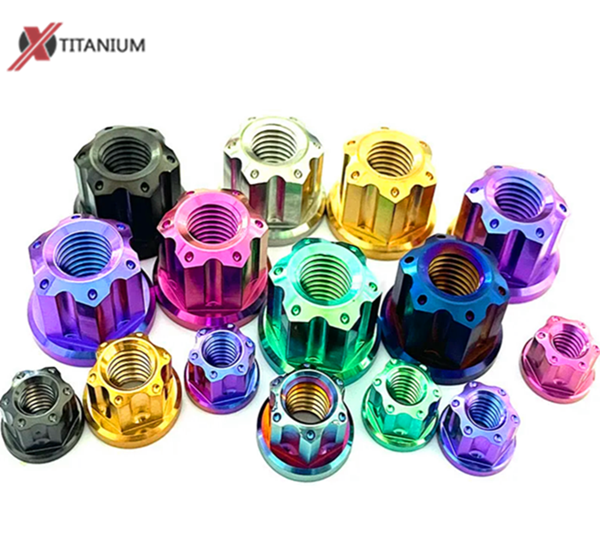The Mechanics and Applications of Spring Washers
Understanding the Design of Spring Washers
Spring washers, particularly titanium spring washers, are engineered with a distinctive split-ring design. This configuration allows the washer to function as a miniature spring when compressed. The washer's slightly conical shape creates tension when flattened between the fastener and the surface. This tension is the key to its anti-loosening properties.
The unique geometry of spring washers enables them to:
- Distribute load evenly across the fastened surface
- Absorb shock and vibration
- Compensate for thermal expansion and contraction
- Maintain consistent pressure on the fastener
Titanium spring washers excel in these functions due to the material's inherent properties. Titanium's high strength-to-weight ratio allows for thinner, lighter washers that don't compromise on performance. Additionally, titanium's excellent corrosion resistance makes these washers ideal for harsh environments where traditional steel washers might fail.
Common Applications of Spring Washers
Spring washers find extensive use in various industries due to their versatility and effectiveness. Some common applications include:
- Automotive Industry: In vehicles, spring washers are crucial components in engine assemblies, suspension systems, and body panels. Titanium spring washers are particularly valuable in high-performance and racing applications where weight reduction is paramount.
- Aerospace: The aerospace sector relies heavily on spring washers to secure critical components in aircraft and spacecraft. Titanium spring washers are preferred here due to their lightweight nature and ability to withstand extreme temperature fluctuations.
- Industrial Machinery: Heavy machinery and equipment often operate in high-vibration environments. Spring washers help maintain the integrity of bolted joints in these challenging conditions.
- Electronics: In electronic devices, spring washers are used to maintain electrical connections and prevent loosening of components due to thermal cycling.
- Construction: Building and infrastructure projects utilize spring washers in steel structures, bridges, and other load-bearing assemblies to ensure long-term stability.
The Advantages of Titanium Spring Washers
Superior Material Properties
Titanium spring washers offer several advantages over their counterparts made from other materials:
- Exceptional Strength-to-Weight Ratio: Titanium's high strength relative to its weight allows for the creation of thinner, lighter washers without sacrificing performance. This property is particularly beneficial in applications where weight reduction is critical, such as aerospace and high-performance automotive engineering.
- Corrosion Resistance: Titanium naturally forms a protective oxide layer, making it highly resistant to corrosion. This property ensures that titanium spring washers maintain their integrity and functionality even in harsh, corrosive environments where other materials might degrade.
- Temperature Resistance: Titanium maintains its mechanical properties across a wide range of temperatures. This characteristic makes titanium spring washers ideal for applications involving extreme heat or cold, where other materials might lose their elasticity or strength.
- Biocompatibility: In medical applications, titanium's biocompatibility makes it an excellent choice for implants and surgical instruments where spring washers might be used.
Enhanced Performance in Demanding Applications
The unique properties of titanium translate into superior performance for spring washers in challenging scenarios:
- Vibration Resistance: Titanium's natural damping properties enhance the ability of spring washers to absorb and dissipate vibrations, making them exceptionally effective in high-vibration environments.
- Fatigue Resistance: The high fatigue strength of titanium allows spring washers to maintain their elasticity and performance over numerous loading cycles, extending their operational lifespan.
- Chemical Inertness: Titanium's resistance to chemical attack makes these spring washers suitable for use in the chemical processing industry, where exposure to aggressive substances is common.
- Magnetic Neutrality: Unlike steel, titanium is non-magnetic. This property makes titanium spring washers valuable in applications where magnetic interference must be avoided, such as in certain medical devices or sensitive electronic equipment.
Choosing and Maintaining Spring Washers
Selection Criteria for Spring Washers
Selecting the appropriate spring washer, especially when considering titanium spring washers, requires careful consideration of several factors:
- Load Requirements: The washer must be capable of withstanding the applied load without deforming permanently. Titanium's high strength makes it suitable for high-load applications.
- Environmental Conditions: Consider the operating environment, including temperature range, exposure to chemicals, and presence of moisture. Titanium's corrosion resistance and temperature stability make it an excellent choice for harsh environments.
- Vibration Levels: In high-vibration applications, the washer's ability to maintain tension is crucial. Titanium spring washers excel in this aspect due to their superior elasticity and damping properties.
- Size and Fit: The washer must be properly sized to fit the bolt and the mounting surface. Incorrect sizing can lead to ineffective load distribution and potential failure.
- Cost Considerations: While titanium spring washers may have a higher initial cost, their longevity and performance in demanding applications can offer long-term cost savings through reduced maintenance and replacement needs.
Proper Installation and Maintenance
To ensure optimal performance and longevity of spring washers, proper installation and maintenance are essential:
Correct Installation:
- Ensure the mating surfaces are clean and free from debris
- Position the washer with the concave side facing the nut or bolt head
- Apply the correct torque as specified for the application
- Avoid over-tightening, which can flatten the washer and negate its spring effect
Regular Inspection: Periodically check the assembly for signs of loosening or wear. Look for:
- Visible flattening of the washer
- Corrosion or damage to the washer surface
- Any movement or play in the fastened joint
Replacement: Replace spring washers if they show signs of permanent deformation, corrosion, or damage. In critical applications, consider preventive replacement at set intervals.
Environmental Protection: In particularly harsh environments, consider additional protective measures such as corrosion-resistant coatings or sealants to further extend the life of the assembly.
By carefully selecting the appropriate spring washer and following proper installation and maintenance procedures, engineers and technicians can ensure the long-term reliability and safety of their mechanical assemblies.
Conclusion
Spring washers, particularly those made from titanium, play a crucial role in maintaining the integrity of mechanical assemblies across various industries. Their unique design and material properties make them indispensable in applications ranging from aerospace to medical devices. By understanding the purpose, advantages, and proper use of spring washers, engineers can significantly enhance the reliability and longevity of their designs.
For more information about titanium spring washers and other titanium products, please contact Baoji Chuanglian New Metal Material Co., Ltd. at info@cltifastener.com or djy6580@aliyun.com. Our team of experts is ready to assist you in finding the perfect titanium solution for your specific needs.
